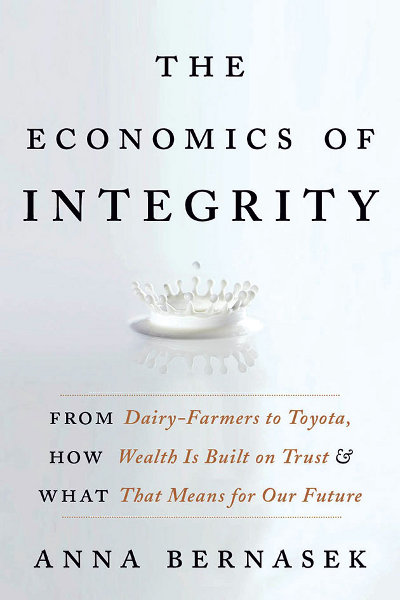
Book Review: The Economics of Integrity

The Economics of Integrity
By Anna Bernasek
Harper Collins Publishers
NY (2010) 195pp
This book is a perfect example of a culture obsessed with subjectivism and idealist philosophies. The book demonstrates the lack of integrity of people (bankers, stock brokers, etc.), claiming that it was the main reason the economy crashed in 2008.
In the prologue we read: “my father, a native of Czechoslovakia, risked his life to escape from communism in 1949…”(p3) Here we go again with the vilifying of communism well past the “cold war.” The author even points to the subjectivism and individualism mentioned above, saying “This book pays tribute to the spirit of this nation, a spirit of optimism and idealism.”(p3) And no wonder, a nation that’s imperialist would send the message to its parasites that there would be food for all, just wait till we steal it from Third World, poor, semi-colonial nations!
One would expect that with economics in it, some portion of this book would discuss political economy. Not the case here, but with vulgar economics the author separates the political from the economy, when in fact the two are intertwined. Instead we are told “to be true to that spirit [optimism and idealism], my focus isn’t on what went wrong. I am not primarily concerned with scandals, fraud and cheating.”(p5) Again, “the economy isn’t some dirty game where all the players are only out for themselves, trying to make their names and their fortunes.”(p5) Wow! A guest commentator on CNN, CNBC spewing this bullshit, shouldn’t be a surprise anyway.
The author basically negates the whole point by saying she is not concerned on what went wrong. The problem is that the whole damn game (capitalism) is in for itself. With one company/corporation trying to maximize their profits how can they not be out for themselves? But with such phrases as “…integrity unlocks enormous opportunities for wealth creation…”(p5), and “It is shared assets that make us wealth.”(p13), or “for without integrity, the economy would not function”(p13), we shouldn’t expect much of an analysis.
The author goes on to propagate the notion that integrity prompts companies to profits, not exploitation. She gives examples like milk production, taking money out of an ATM, Toyota, LL Bean, and banks. Besides some interesting factoids about these corporations (Of the world’s official gold holdings (March 2009), Amerika holds 27%, Germany 11%, IMF 11% (p67). The top 3 brands and their wealth is as follows 1) Coca-cola - 66,667 (U$) 2) IMB-59,031(U$) 3) Microsoft -59,007(U$) (2008 brand values (millions)) (p124).), the book is a joke.
What the author fails to realize is that integrity does not create wealth in itself. Surplus value is the source of wealth. Not from First World world workers but from Third World proletarians who are paid less than the value of their labor for their productive work. Hopefully the author can come to grips with classes and national oppression more easily than pseudo vulgarist economy. What this simply amounts to is an apology for the loss the parasites in the U.$. felt during the 2008 meltdown.
Related Articles:








